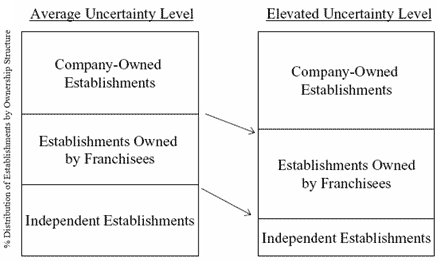Strategy Leadership Economics Apr 30, 2007
Uncertainty and Independence
The Effect of Risk on Franchising
Consider a salaried employee who has just received word of a new compensation plan at his or her place of employment: all future compensation will now be based 100 percent on personal job performance. The new pay structure introduces new risks—but also potentially greater returns—that the employee must take into account. Is it worth it to remain with the employer and operate as an independent agent, or is it better to affiliate with a company that offers more security? The answer depends on the employee’s risk appetite as well as the uncertainty associated with the employee’s future earnings.
Retail entrepreneurs face a decision similar to that of the employee described above—whether to operate independently or to contract as a franchisee for an established firm. On the one hand, chain-affiliated outlets may have higher returns due to cost savings from scale economies or cost avoidance of required marketing expenditures. On the other hand, as a franchisee, the entrepreneur is required to share returns with the parent firm. New research on the motel industry indicates that these affiliation decisions are driven in part by underlying economic uncertainty.
Uncertainty and Affiliation Decisions: Lessons from the Motel Industry
Michael Mazzeo, a professor at the Kellogg School of Management, conducted research analyzing motel affiliation across 492 markets and found that motel chain affiliation is more common than independent ownership when there is greater uncertainty about the prospects for an individual outlet’s success. Factors that contribute to uncertainty for a given motel location include proximity to an interstate highway, room capacity, competition, resident income, traffic volume, and the industry’s economic fluctuation. Under conditions of uncertainty, chain affiliation is beneficial because it helps to stabilize demand for an individual outlet.
To the extent that consumers value quality in their choice of a motel and have never stayed at a particular outlet, affiliation with an established motel brand should increase demand for an individual establishment’s services. This affiliation could allow the motel operator to charge higher prices, increase room utilization, or both. Further, motels belonging to chains may also be able to reduce costs by sharing advertising, purchasing, or telephone reservation systems with fellow chain affiliates to achieve economies of scale.
Of course, a potential franchisee must weigh these benefits against the costs of being part of the chain. The contract between franchisor and franchisee typically includes an initial fee to join the organization (between $20,000 and $50,000) and a percentage of ongoing revenue to reimburse advertising, marketing, and costs associated with the use of centralized reservation systems (between 6 percent and 9.25 percent). In addition, chains monitor the services provided by affiliated properties and have considerable authority to require new investment as a condition of continued affiliation. It may be costly for motels to provide the services required to meet the quality standard for the parent organization.
In the motel industry, several factors linked to uncertainty increase the likelihood of chain affiliation for individual outlets:
- Highway proximity – Motel properties adjacent to interstate highways primarily serve long-distance travelers, who may never have stayed at a motel along their route. Because the quality of any individual motel on the route is uncertain, these individuals are likely to prefer an outlet that provides a familiar level of quality—particularly if the traveler has stayed at a similar outlet before. Therefore, chain affiliation is common among motels adjacent to an interstate highway.
- Room capacity – Because large-capacity properties are subject to uncertainty with regard to nightly demand, during periods of low demand the motel may not be able to operate profitably due to low room utilization. Therefore, motels with a greater number of rooms are more likely to affiliate with chains to ensure sufficient demand. Further, larger-capacity properties can more easily recover the fixed component of a franchise fee.
- Competition, local area income, and traffic levels – Chain affiliation is more common in markets where competition is present, residents have higher incomes, and traffic levels are high. First, given the presence of competing properties, a client is less likely to risk staying at a motel for which quality is uncertain. Second, high-income clientele tend to be less sensitive to price, and therefore value assured quality at a given price over uncertain quality at a lesser price. Finally, for properties in high-traffic areas, a larger share of potential clientele value motel quality and are attracted to brand names they have seen or have patronized at other locations. Therefore, motels are less likely to remain independent in the presence of competition, high-income residents, and high traffic.
- High economic variability in industry – Finally, chain affiliation predominates over independent operation where there has been higher economic variability in the industry over time.
In each of these cases, higher levels of uncertainty lead to higher levels of franchising. Uncertainty drives would-be entrepreneurs to pick a franchise or work for a company-owned establishment rather than create an independent venture.
Figure 1: Potential Establishment Ownership with Varying Uncertainty

Implications
Research shows that higher uncertainty clearly reduces the willingness of individuals or firms to operate independently. Lessons from the motel industry concerning the relationship between uncertainty and affiliation apply more broadly across the retail sector and other industries. For example, in fragmented retail markets where franchise models are uncommon, such as apparel, electronics, or supermarkets, unknown firms tend to fill inventory stock with branded goods easily recognized by consumers.
In service industries, uncertainty created by up-or-out promotion policies might lead employees to demand higher base compensation. Similarly, pay structures involving significant pay “at risk” due to performance-based bonuses can lead employees to seek higher compensation percentages. These effects are more pronounced among individuals with a lower tolerance for risk—for example, employees with families or those nearing retirement age.
Additionally, managers should consider levels of economic uncertainty when analyzing business partnerships and negotiating with suppliers. Higher degrees of supplier or collaborator uncertainty driven by low customer traffic, small market size, low customer income, or high industry variability can indicate a stronger position when pricing goods and reaching contractual agreements.
“Retail Contracting and Organizational Form: Alternatives to Chain Affiliation in the Motel Industry,” Journal of Economics and Management Strategy, Winter 2004.


